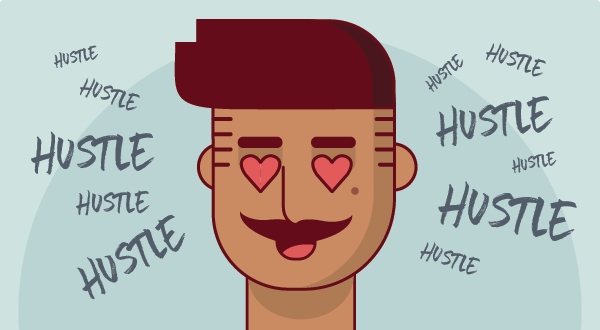Wil Schroter

Startup culture has gone from glorifying victory to glorifying effort.
"Hustle Porn" has become more and more popular, particularly on social media, where would-be champions of entrepreneurship proclaim their insane personal sacrifices to the Gods of Startups. We're constantly wooed with tales of Founders putting in insane hours, risking it all, and coming away with the spoils of success to show for it.
How much of this is really a celebration of hard work and is how much is just the equivalent of giving ourselves a Participation Award for effort?
"I just put in 100 hours this week!"
Let's start by debunking the myth that working 100 hours in a week is somehow a victory to be lauded — it's not. The intention is that we're SO dedicated to our startup that we're willing to work every waking hour to make it successful. That sounds so incredibly dedicated, how could we not celebrate it?
What we're confusing is "dedication" from "time management." Yes, that's incredible dedication, and no that's not a great use of time management. If it takes us 100 hours in a week to get something done we're either really bad at it, or we're horrible at managing our time — or both.
A well-tuned time management strategy combines maximizing our peak hours (which for most people are 2 to 3 a day, not 12) and optimizing rote tasks. If at the end of a 12 hour day we say "I couldn't have made that day any shorter!" we're totally lost on optimization. Make meetings run in half the time. Offload rote tasks to virtual assistants for a fraction of the cost. Spend less time on social, Slack, and all of the other distractions that eat up half of our days. There's almost no possible way we can have a totally optimized 100 hour week.
"I'm crushing it!"
Founders who say "I'm crushing it" are rarely crushing anything but themselves. We've somehow gotten to the point where when people tell us they are running themselves into the ground, we high-five them.
All we need to do is replace "crushing it" with the expense of that effort. "I'm crushing my savings. I'm crushing my relationships. I'm crushing my health." Can we ever think of a world where anyone would get a high five for those things? Hell no!
We can't pretend to glorify the expression without considering the costs, or for that matter, the ROI. Do we need to destroy ourselves for gains? Probably not. It's possible to make strong gains without totally destroying ourselves in the process — it's called pacing ourselves.
"Look at me on social media!"
This brings us to the worst culprit of them all — the self-aggrandizing social media post. All we see on social media are the "best of mixtapes" of people's lives, which if we're being honest, are fabricated at best and a total sham at worst.
This is the worst type of Hustle Porn because it implies so much that's not true. "Look at me getting on a private jet!" (it's not yours). "Look at our huge round of funding!" (your business has no path to profit). "Look at this sweet vacation I'm taking!" (as your spouse is filing for divorce).
No one ever posts "Look at how I just missed my kid's soccer game!" or "Look at how I'm overdue on all of my credit card bills!" We've come to believe that those posts represent the full spectrum of how this game really works. If Founders only posted how things were really going on social media we'd all be in therapy for life.
Heads Down, Mouth Shut
Realistically, Founders who are doing the real work don't spend all their time talking about the effort — they are focused on the results. No one cares how hard we're working, they care about whether that work turns into true outcomes. We need to put a bullet in the Hustle Porn culture and call it what it is — a massive distraction for what really matters — the outcomes.
In Case You Missed It
How Much Should I Be Working? (podcast). Wil and Ryan take a deep dive into the benefits of thinking quality and not quantity when it comes to your weekly punch card.
Manage Downside First, Big Opportunity Second Having a downside strategy allows for open conversations to conclude effective upside plans and address issues level-headedly.
I’m Burnt Out. What Do I Do? When we hit a point of burn out it's important that we understand what to do about it. If we ignore it, the problem only gets much worse. So let's take a look at what Founders do to deal with burnout head-on.
Find this article helpful?
This is just a small sample! Register to unlock our in-depth courses, hundreds of video courses, and a library of playbooks and articles to grow your startup fast. Let us Let us show you!
Submission confirms agreement to our Terms of Service and Privacy Policy.
Already a member? Login
Start a Membership to join the discussion.
Already a member? Login

Most people just need to stop reading those articles and just start taking action. If you need to put in alot of hours one week to make things happen, then do it. If you can't, then take a break and reassess where your time/effort is being spent and then determine if you are cut out for it...or if you need to completely change your process to make it work better for you. Running a business, esp if it's your first go at it, isn't going to be easy and why most people aren't cut out for it. When shit hits, it tends to hit all at once from multiple directions. If you are able to grind through those tough times and learn from them, you will become more efficient at decisions and thus decrease your hours spent. How does the quote go - "Calm waters never made a good sailor."